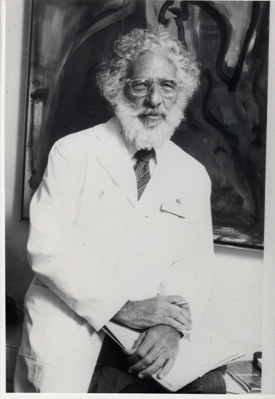Named after Nathan Kline, M.D. (1916-1983), best known for his pioneering work with psychopharmacologic drugs, the Nathan S. Kline Institute for Psychiatric Research was established in 1952, when Dr. Kline and associates opened a research unit at the then Rockland State Hospital, now Rockland Psychiatric Center. This developed into the freestanding Rockland Research Institute, and upon Kline’s death in 1983, the Institute was renamed in memory of Dr. Kline.

Kline’s work, utilizing reserpine and iproniazid to treat psychiatric disorders, has been acknowledged as a major factor in opening a new era in psychiatry. For his studies with tranquilizers and antidepressants, he was twice awarded the prestigious Albert Lasker Medical Research Award.
Dr. Kline’s reputation drew biomedical researchers from around the world. Psychopharmacology was emphasized and many new drugs were given clinical trials, as well as investigations of the safety and utility of long-term drug use.
Laboratory techniques were developed to determine safe, effective doses of frequently used medications. Kline foresaw the potential of applying computer technology to psychiatry, believing that it could be used in large scale epidemiological studies and could streamline the administration of complex health facilities.
He oversaw the installation at Rockland in 1968 of a major computer center, funded by the Federal government, and guided the development of computerized medical systems, many of which led to improvements in the quality of patient care.
As an advisor to international health agencies such as the World Health Organization (WHO) and CARE-Medco, Kline was aware of the dearth of medical treatment for mental disorders in developing countries. He traveled widely and devoted much time to establishing and visiting mental health clinics and programs in other parts of the world.
Kline was founder and director of the International Committee Against Mental Illness. He was also a prolific writer, authoring nearly 500 scientific publications, magazine and newspaper articles for the general public, and a book, From Sad to Glad. He made frequent appearances as a guest on radio and television shows in his attempt to educate the public about mental illness and research.
A Few of Our Successes:
- Introduction of pharmacologic treatment for depression and affective disorders;
- Application of computers to psychiatry;
- Development of the first mental health information systems;
- Demonstration of the efficacy, dosage and safety of new psychotropic drugs and their generic bioequivalents;
- Development of now widely used laboratory assay technology to measure therapeutic blood levels;
- Development of statistical design techniques and data analysis methodologies for clinical trials;
- Discovery of the optimal plasma level of haloperidol for treatment of schizophrenia.
The NKI Library holds archival material documenting the Institute’s history. To see a sampling of historical photos, visit our collection on the Hudson River Valley Heritage (HRVH) website. The images date from the mid-1960s to the mid-1980s, and show former Institute directors, as well as some State and local politicians, and other notable mental health figures.

